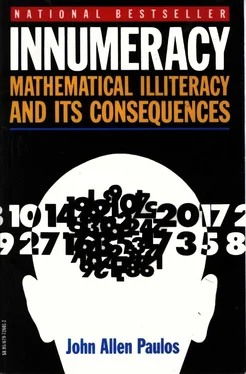Someone offers you a choice of two envelopes and tells you one has twice as much money in it as the other. You pick envelope A, open it, and find $100. Envelope B must, thus, have either $200 or $50. When the proposer permits you to change your mind, you figure you have $100 to gain and only $50 to lose by switching your choice, so you take envelope B instead. The question is: Why didn't you choose B in the first place? It's clear that no matter what amount of money was in the envelope originally chosen, given permission to change your mind, you would always do so and take the other envelope. Without any knowledge of the probability of there being various amounts of money in the envelopes, there is no way out of this impasse. Variations of it account for some of the "grass is always greener" mentality that frequently accompanies the release of statistics on income.
One more game. Flip a coin continuously until a tail appears for the first time. If this doesn't happen until the twentieth (or later) flip, you win $1 billion. If the first tail occurs before the twentieth flip, you must pay $100. Would you play?
There's one chance in 524,288 (2 19) that you'll win the billion dollars and 524,287 chances in 524,288 that you'll lose $100. Even though you're almost certain to lose any particular bet, when you win (which the law of large numbers predicts will happen about once every 524,288 times on the average), your winnings will more than make up for all your losses. Specifically, your expected or average winnings when playing this game are (1/524,288) x ( + one billion) + (524,287/524,288) x (- one hundred), or about $1,800 per bet. Still, most people will choose not to play this game (a variant of the so-called St. Petersburg paradox) despite its average payoff of almost $2,000.
What if you could play as often and as long as you pleased and didn't have to settle up until you were finished playing? Would you play then?
Obtaining random samples is a difficult art, and the pollster doesn't always succeed. Neither, for that matter, does the government. The 1970 draft lottery, wherein numbers from 1 to 366 were placed in little capsules to determine who was to be drafted, was almost certainly unfair. The 31 capsules for January birth dates were placed in a large bin, then the 29 February capsules, and so on up to December's 31 capsules. There was some mixing of the bin along the way, but apparently not enough, since the December dates were disproportionately represented among the early choices, whereas dates from the first months of the year came up near the end significantly more often than chance would dictate. The 1971 lottery used computer-generated tables of random numbers.
Randomness is not easy to obtain when playing cards, either, since shuffling a deck two or three times is not enough to destroy whatever order it might have. As statistician Persi Diaconis has shown, six to eight riffle shuffles are usually necessary. If a deck of cards in a known order is shuffled only two or three times and a card is removed from it and replaced somewhere else in the deck, a good magician can almost always locate it. Using a computer to generate a random ordering to the cards is the best though perhaps an impractical way to get random decks.
One amusing way in which illegal gambling operations obtain daily random numbers which are publicly accessible is to take the hundredth digit, the last and most volatile digit of each day's Dow Jones Industrials, Transportation, and Utilities indices respectively, and juxtapose them. For example, if the Industrials closed at 2213.27, the Transportation stocks at 778.31, and the Utilities at 251.32, then the number for the day would be 712. Since the volatility of these last digits makes them essentially random, every number from 000 to 999 is equally likely to come up. And no one need fear that the numbers are being cooked either, since they appear in the prestigious Wall Street Journal, as well as in more plebeian papers.
Randomness is essential, however, not just to ensure fair gambling, polling, and hypothesis testing, but also for modeling any situation which has a large probabilistic component, and for this purpose millions of random numbers are required. How long will someone have to wait in line at a supermarket under different conditions? Design an appropriate program which models the supermarket situation with its various constraints and instruct the computer to run through the program a few million times to see how often different outcomes result. Many mathematical problems are so intractable, and experiments involving them so expensive, that this kind of probabilistic simulation is the only alternative to giving up on them. Even when a problem is easier and it's possible to solve it completely, simulation is frequently faster and cheaper.
For most cases, the pseudorandom numbers generated by computers are good enough. Random for most practical purposes, they are actually generated by a deterministic formula which imposes sufficient order on the numbers as to render them useless for some applications. One such application is to coding theory, which allows government officials, bankers, and others to pass classified sensitive information without fear that it will be unscrambled. In these cases, one mixes pseudorandom numbers from several computers, then incorporates the physical indeterminacy of randomly fluctuating voltages from a "white noise" source.
Slowly emerging is the strange notion that randomness has an economic value.
Statistical significance and practical significance are two different things. A result is statistically significant if it's sufficiently unlikely to have occurred by chance. This by itself doesn't mean much. Several years ago, a study was conducted in which one group of volunteers received a placebo and another group received very large doses of Vitamin C. The group receiving Vitamin C contracted colds at a slightly lower rate than did the control group. The size of the sample was big enough that it was quite unlikely that this effect was due to chance, but the difference in rate was not all that impressive or significant in a practical sense.
A good number of medications have the property that they're demonstrably better than nothing, but not by much. Medicine X which immediately alleviates 3 percent of all headaches in test after test is certainly better than nothing, but how much would you spend on it? You can be sure that it would be advertised as providing relief in a "significant" percentage of cases, but the significance is only statistical.
Usually we encounter the opposite situation: the result is of potential practical significance but of almost no statistical significance. If some celebrity endorses a brand of dog food, or some cabdriver disapproves of the mayor's handling of a dilemma, there's obviously no reason to accord statistical significance to these personal expressions. The same is true of women's magazine quizzes: How to tell if he loves someone else; Does your man suffer from the Boethius complex?; Which of the seven types of lover is your man? There's almost never any statistical validation to the scoring of these quizzes: Why does a score of 62 indicate a man is unfaithful? Maybe he's just getting over his Boethius complex. Where did this seven-part typology come from? Though men's magazines often suffer from worse sorts of idiocies having to do with violence and assassins for hire, they rarely have these fatuous quizzes in them.
There's a strong human tendency to want everything, and to deny that trade-offs are usually necessary. Because of their positions, politicians are often more tempted than most to indulge in this magical thinking. Trade-offs between quality and price, between speed and thoroughness, between approving a possibly bad drug and rejecting a possibly good one, between liberty and equality, etc., are frequently muddled and covered with a misty gauze, and this decline in clarity is usually an added cost for everyone.
Читать дальше












